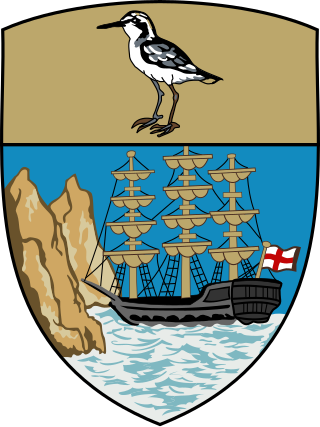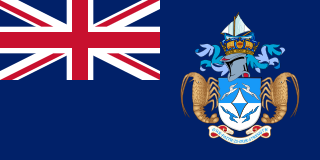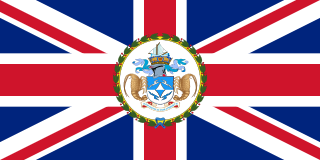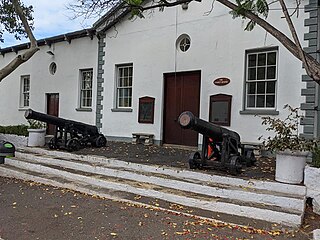Saint Helena, Ascension and Tristan da Cunha are British Overseas Territories in the south Atlantic Ocean.

Politics of Saint Helena takes place in a framework of limited self-government as a dependent territory of the United Kingdom, whereby the governor is the head of government. Saint Helena, an island in the southern Atlantic Ocean, is a part of the British overseas territory of Saint Helena, Ascension and Tristan da Cunha.

Tristan da Cunha, colloquially Tristan, is a remote group of volcanic islands in the South Atlantic Ocean. It is the most remote inhabited archipelago in the world, lying approximately 2,787 kilometres (1,732 mi) from Cape Town in South Africa, 2,437 kilometres (1,514 mi) from Saint Helena, 3,949 kilometres (2,454 mi) from Mar del Plata in Argentina, South America and 4,002 kilometres (2,487 mi) from the Falkland Islands.
Tristan da Cunha is part of the British overseas territory of Saint Helena, Ascension and Tristan da Cunha and has a history going back to the beginning of the 16th century. It was settled by men from military garrisons and ships, who married native women from Saint Helena and the Cape Colony. Its people are multi-racial, descended from European male founders and mixed-race and African women founders.

The British Overseas Territories (BOTs) are the 14 territories with a constitutional and historical link with the United Kingdom that, while not forming part of the United Kingdom itself, are part of its sovereign territory. The permanently inhabited territories are delegated varying degrees of internal self-governance, with the United Kingdom retaining responsibility for defence, foreign relations and internal security, and ultimate responsibility for good governance. All of the territories are inhabited by civilians, except three that are chiefly or only inhabited by military or scientific personnel. All fourteen have the British monarch as head of state. These UK government responsibilities are assigned to various departments of the Foreign, Commonwealth and Development Office and are subject to change.

The flag of Saint Helena consists of a Blue Ensign defaced with the shield from the British overseas territory's coat of arms. Adopted in 1984 shortly after the island was granted a new coat of arms, it has been the flag since. Saint Helena's flag is similar to the flags of eight other British Overseas Territories, which are also Blue Ensigns with their respective coats of arms.

The Governor of Saint Helena is the representative of the monarch in Saint Helena, a constituent part of the British Overseas Territory of Saint Helena, Ascension and Tristan da Cunha. The governor is appointed by the monarch on the advice of the British government. The current governor of Saint Helena has been Nigel Phillips since 13 August 2022.

The governor of Tristan de Cunha is the representative of the monarch in Tristan da Cunha, a constituent part of the British Overseas Territory of Saint Helena, Ascension and Tristan da Cunha. The governor is appointed by the monarch on the advice of the British government. The role of the governor is to act as the de facto head of state.
Ascension Island is an island in the South Atlantic Ocean, part of the wider British overseas territory of Saint Helena, Ascension and Tristan da Cunha. Like other British Overseas Territories, it issues its own postage stamps, which provide a source of income for the island from sales to overseas collectors, as well as being used for domestic and international postage.

The coat of arms of Saint Helena, part of the British Overseas Territory of Saint Helena, Ascension and Tristan da Cunha, was authorised on 30 January 1984.

The Supreme Court of St Helena together with the St Helena Court of Appeal are the Senior Courts of the British Overseas Territory of Saint Helena, Ascension and Tristan da Cunha.

The Governor of Ascension is the representative of the monarch in Ascension Island, a constituent part of the British Overseas Territory of Saint Helena, Ascension and Tristan da Cunha. He is appointed by the monarch on the advice of the British government, his role is to act as the de facto head of state.

The following outline is provided as an overview of and topical guide to Saint Helena:

Ascension Island is an isolated volcanic island, 7°56′ south of the Equator in the South Atlantic Ocean. It is about 1,000 miles (1,600 km) from the coast of Africa and 1,400 miles (2,300 km) from the coast of South America. It is governed as part of the British Overseas Territory of Saint Helena, Ascension and Tristan da Cunha, of which the main island, Saint Helena, is around 800 miles (1,300 km) to the southeast. The territory also includes the sparsely populated Tristan da Cunha archipelago, 2,300 miles (3,700 km) to the south, about halfway to the Antarctic Circle.

Lesbian, gay, bisexual and transgender (LGBT) rights in the British Overseas Territory of Saint Helena, Ascension and Tristan da Cunha have gradually evolved over the years. Discrimination on the basis of sexual orientation is banned in the entire territory through the Constitution Order 2009 and same-sex marriage has been legal on the islands since 2017.

Saint Helena, Ascension and Tristan da Cunha is a British Overseas Territory located in the South Atlantic and consisting of the island of Saint Helena, Ascension Island, and the archipelago of Tristan da Cunha. Its name was Saint Helena and Dependencies until 1 September 2009, when a new constitution came into force, giving the three islands equal status as three territories, with a grouping under the Crown.
This is a list of public holidays in Saint Helena, Ascension and Tristan da Cunha, a British overseas territory in the South Atlantic Ocean consisting of Saint Helena, Ascension Island and Tristan da Cunha.
The United Kingdom possesses a number of islands in the South Atlantic Ocean and claims a section of the Antarctic continent. These territories are St. Helena with Ascension Island and Tristan da Cunha, the Falkland Islands, South Georgia and the South Sandwich Islands, and the UK's claimed Antarctic territory, called the British Antarctic Territory. The official currency in these territories is either Pound sterling or a local currency that evolved from sterling and is at a fixed one-to-one parity with sterling.

The politics of Saint Helena, Ascension and Tristan da Cunha operate under the jurisdiction of the government of the United Kingdom. The three parts of the territory—Saint Helena, Ascension Island and Tristan da Cunha—effectively form an asymmetric federacy and collectively constitute one of United Kingdom's fourteen overseas territories.
Same-sex marriage has been legal in Saint Helena, Ascension and Tristan da Cunha since 2017. An ordinance to open marriage to same-sex couples in Saint Helena was passed by the Legislative Council in a 9–2 vote on 19 December 2017. It went into force the following day, and the first same-sex marriage was performed on 31 December 2018. Same-sex couples have also been able to marry on Ascension Island since 1 January 2017 and in Tristan da Cunha since 4 August 2017.











